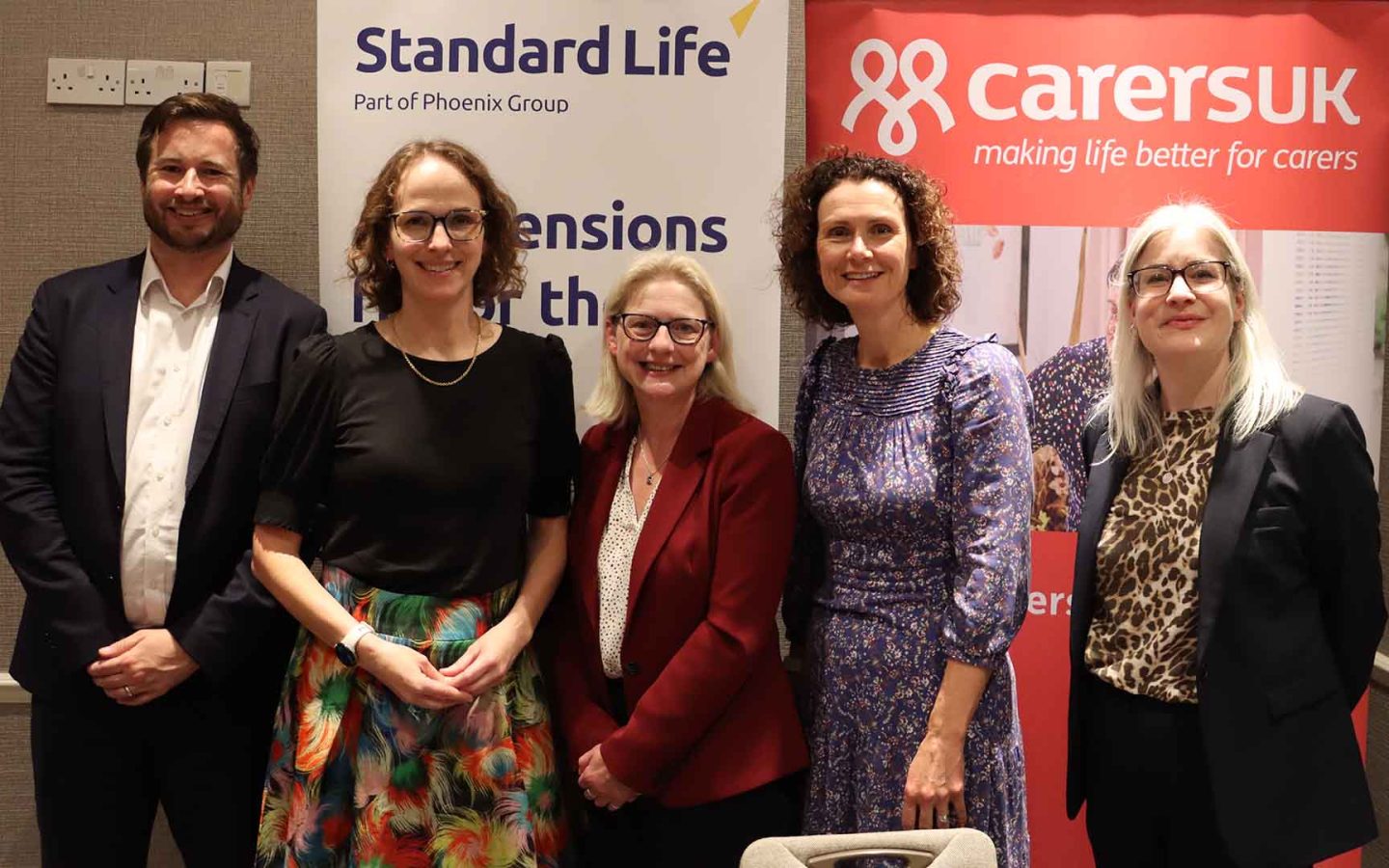Representatives from the Centre for Care were delighted to attend the Liberal Democrat and Labour Party Conferences in September 2025. This attendance aligns with the Centre for Care’s mission: to share our research with a wide range of stakeholders who are interested in the challenges faced by carers and complexities of the care sector.
Here we share our reflections on attending the conferences and our assessment of political priorities around care.
Liberal Democrat Party Conference
The Liberal Democrats have been supportive of care-related issues and during the past twelve months Liberal Democrat MPs have worked closely with the Centre for Care to further conversations about a number of issues including challenges for unpaid carers and tackling digital exclusion.
During our time at the Liberal Democrat Party Conference, we hosted an exhibition stand where we had the opportunity to showcase our work and engage in meaningful conversations with MPs, peers, local Liberal Democrat councillors, and a range of other stakeholders. It was a fantastic platform to present some of our key outputs, including the Unpaid Care Dashboard, our board game, and the newly developed comic.
We also shared briefings on a number of important research projects at the Centre for Care, including:
- our report highlighting the economic value of kinship care;
- research calling for a new National Carers Strategy to support carers,
- policy recommendations for an improved care workforce
- and a proposal to assist young adults’ self identification as carers.
During the conference, we hosted a fringe event where we showcased the Unpaid Care Dashboard and demonstrated how data can be used to inform and enhance localised support for unpaid carers. We were joined by a panel of experts including Alison Bennett MP for Mid Sussex, John Perryman (Carers UK), George Appleton (SCIE) and Dr Wendy Taylor (Liberal Democrat Councillor). They provided insightful reflections on how they believe robust data ,presented in innovative, easy to understand ways such as our dashboard, can provoke change.
We also supported a Carers UK event on ‘Supporting people to juggle paid work and unpaid care’. Centre for Care Director Professor Kate Hamblin joined a panel with Alison Bennett MP and Wendy Chamberlin MP, where discussions focussed around the need for paid carers leave to better support unpaid carers to stay in work, which the Centre has been advocating for in its research.
It was encouraging to observe and attend a number of other sessions that were focussed on care. This included a Carers Trust event, ‘Ending Carer Poverty’ – as well as Panel discussions about Health and Social Care with the Liberal Democrat spokesperson for Health and Social Care, Helen Morgan MP.
Centre for Care Deputy Director Nathan Hughes attended a roundtable event entitled ‘Shifting the Dial on Children’s Social Care: How we can deliver for children and young people’. Chaired by Will Forster MP, the event brought together local leaders and national policy makers to reflect on the pace of change in children’s social care and why getting children’s social care right matters for children and families.
Kate Hamblin also attended a policy motion, brought forward by Alison Bennett MP highlighting the need for better hospice care in the UK. Most notably the motion discussed a ‘postcode lottery’ on the quality of hospice care provided and the need for better support nationally.
The Liberal Democrat Party Conference was highly valuable for the Centre for Care as we engaged with many MPs and local authority councillors, receiving a great deal of interest from them in how our Unpaid Care Dashboard and related research can improve support for unpaid carers in their local areas. We are confident that supporting local stakeholders to utilise this tool can improve their ability to provide targeted intervention for unpaid carers.
Labour Party Conference
During our time at the Labour Party Conference, Centre for Care Director Professor Kate Hamblin was invited as a guest speaker during the Carers UK fringe event: ‘Supporting people to juggle paid work and unpaid care’.
Kate discussed international examples of employment support for unpaid carers, showcasing the lessons that UK policymakers could take from countries offering unpaid carer’s leave, such as Japan and Australia, and other employer policies supporting working carers. She was joined on the panel by Carers UK Chief Executive Helen Walker, Stephen Kinnock MP (Minister for Health and Social Care), Anna Dixon MP, (MP for Shipley and Chair of the APPG for Carers); Ben Harrison from the The Work Foundation; and Timothy Fassam from the Phoenix Group.
During the fringe event Stephen Kinnock discussed how Labour were dedicated to improving care services and described the Casey Commission as a key opportunity to identify how change can be achieved. He discussed championing unpaid care through a cross-party group and recent work to review paid care leave in the Employment Rights Bill. Panel members discussed the urgent need for paid carer’s leave to enable people who care to stay in employment and avoid leaving work to fulfill their caring responsibilities, considering that our recent research with Carers UK shows 600 people per day give up work to care. It was encouraging to see that paid carer’s leave was proposed as an amendment to the employment rights bill; despite the amendment not being passed, the Centre for Care welcomes the commitment to hold a public consultation.
Kate was also invited to contribute to a private roundtable hosted by Carers Trust exploring the challenges and opportunities for improving local carer support. This was a wonderful opportunity for local government, service providers, academics and MPs to identify some of the most pressing issues for unpaid carers. It was yet another occasion to showcase the Unpaid Care Dashboard to demonstrate that data is available at a local authority level. The group discussion focussed on the unequal gender distribution of caring responsibilities, young carers and the high likelihood that all of us will at some point be a carer or in receipt of care.
Reflections – political priorities and care
The Liberal Democrat and Labour party conferences were an excellent vehicle for the Centre to liaise with a wide range of stakeholders interested in research around care and tackling persistent challenges in the care sector. There was a palpable interest to engage in care research particularly from Liberal Democrat MPs, councillors and party members, along with multiple fringe events across the conference focussed on care. This reflects the continued interest in prioritising care in their party manifesto. It feels clear, from their messaging and their actions, that the Liberal Democrat Party remains dedicated to social care reform and addressing inequalities for unpaid carers.
The Centre for Care welcomes how Labour has visibly prioritised care through collaboration with the Casey Commission, which is an opportunity to discuss reform of adult social care whilst ensuring the role that unpaid carers play is recognised and they are supported appropriately. Many of the fringe events at Labour were focussed on the NHS 10 year plan, we recognise that adult social care and unpaid carers are vital to be acknowledged for the role they play in that ecosystem. During said fringe events, we brought that to the attention of the discussion through targeted questions.
The Centre for Care is hopeful that opportunities to improve the lives of carers will materialise with the Casey commission and the cross-government working group on unpaid care. Equally, we acknowledge that a change in Minister for the Department for Business and Trade might glean further opportunities for engagement with government policymakers on the challenges faced in the care sector.
What next?
As a result of the strong connections made and events attended at the party conferences, the Centre will work across many different localities to delve into their demographic data on unpaid care. Equally, the Centre continues to host and attend important events where care is the topic of discussion. On the 5th November, we will be co-hosting with Steve Darling MP, a Westminster event open to all MPs to discuss the prevalence of digital exclusion, a pervasive challenge for unpaid carers. At the event, the Centre will showcase our life size boardgame which exemplifies the specific barriers to digital inclusion using personas based on real life data.
The Centre for Care will continue to engage with external stakeholders as we look to collaboratively ensure that our research impacts positively on people who provide and receive care.
About the authors
Lucy is an Impact Associate in the Centre for Care, working closely with academics to improve the impact of research in decision making processes for key stakeholders across government policy and third sector organisations.
Fay is the Impact Specialist in the Centre for Care, working with academics and external partners including stakeholders, voluntary sector organisations and policy makers to mobilise research findings to achieve impact beyond academia. Her role is to work with our researchers to plan for impact. Fay identifies partnerships and explores collaborative opportunities to ensure research findings are widely shared, to influence practice and policy.
Kate Hamblin is Professor of Social Policy and Director of the Centre for Care. She joined the University of Sheffield in 2018 to work on the Sustainable Care programme. She also currently leads the Centre for Care’s Digital Care research theme and is the UK Networks and geographical lead for the North and East-Midlands in the IMProving Adult Care Together (IMPACT) evidence implementation Centre. She is also the Policy and Practice Liaison lead for the NIHR School for Social Care Research at the University of Sheffield.
Nathan Hughes is Professor of Adolescent Health and Justice, co-director of CIRCLE – the Centre for International Research on Care, Labour and Equalities – at the University of Sheffield.
He is Deputy Director of the Centre for Care, and lead for the Children and Families theme. This reflects his broad research interests in effective support to vulnerable young people, including those affected by health and developmental difficulties and those within the child protection system.
Dan is currently Digital and Communications Coordinator at the Centre for Care and continues his work as producer of the CARE MATTERS podcast, as well as producing animations, videos, various other digital outputs and maintaining the Centre for Care website and social media platforms.
Dan created the ‘Mind the Gap’ board game in 2024, developing this idea with award-winning artist Paul Evans for the ESRC Festival of Social Science 2024. The game has since been on tour around England with new versions being developed with colleagues at the University of Sheffield, and in collaboration with national charities.









